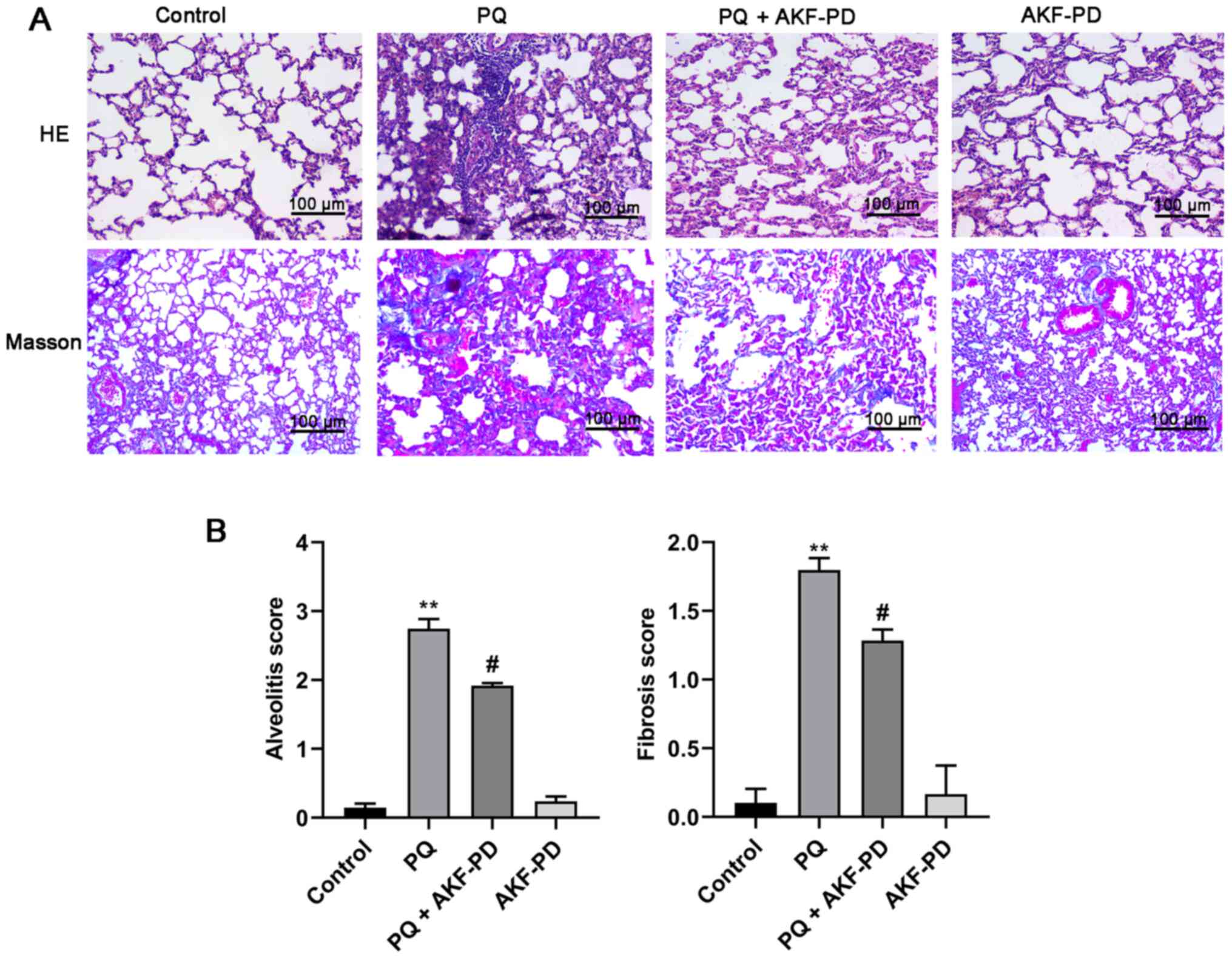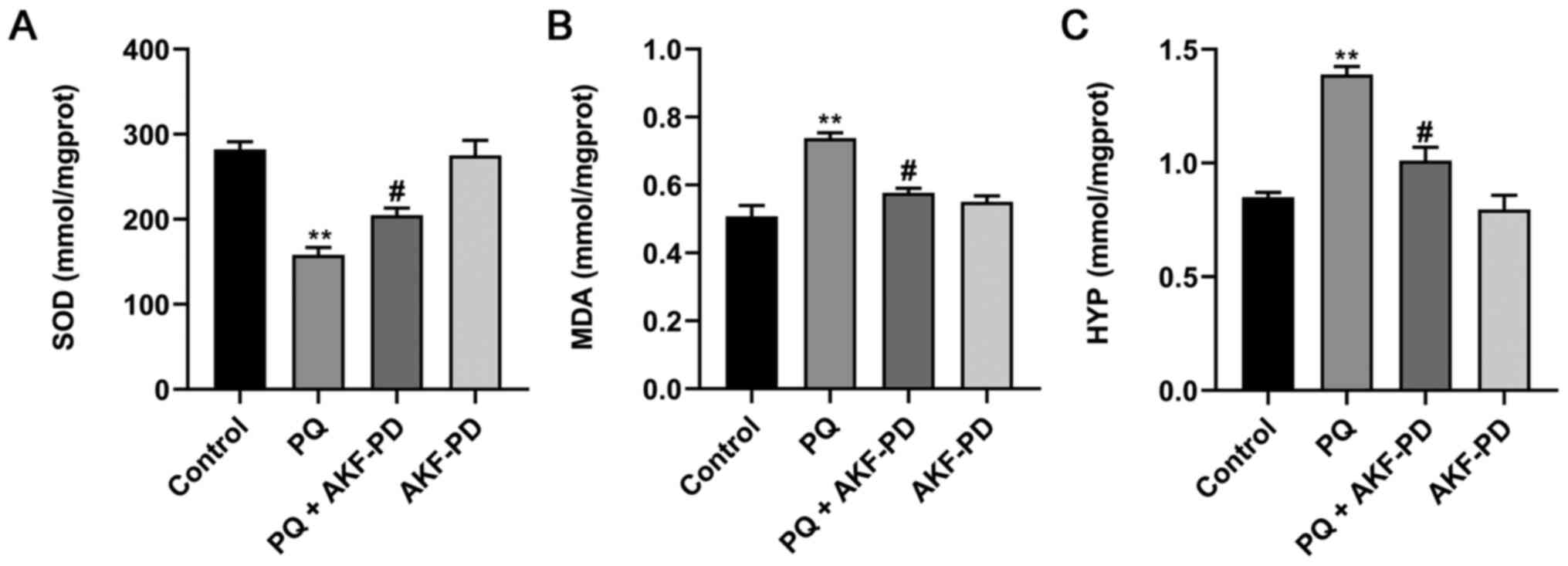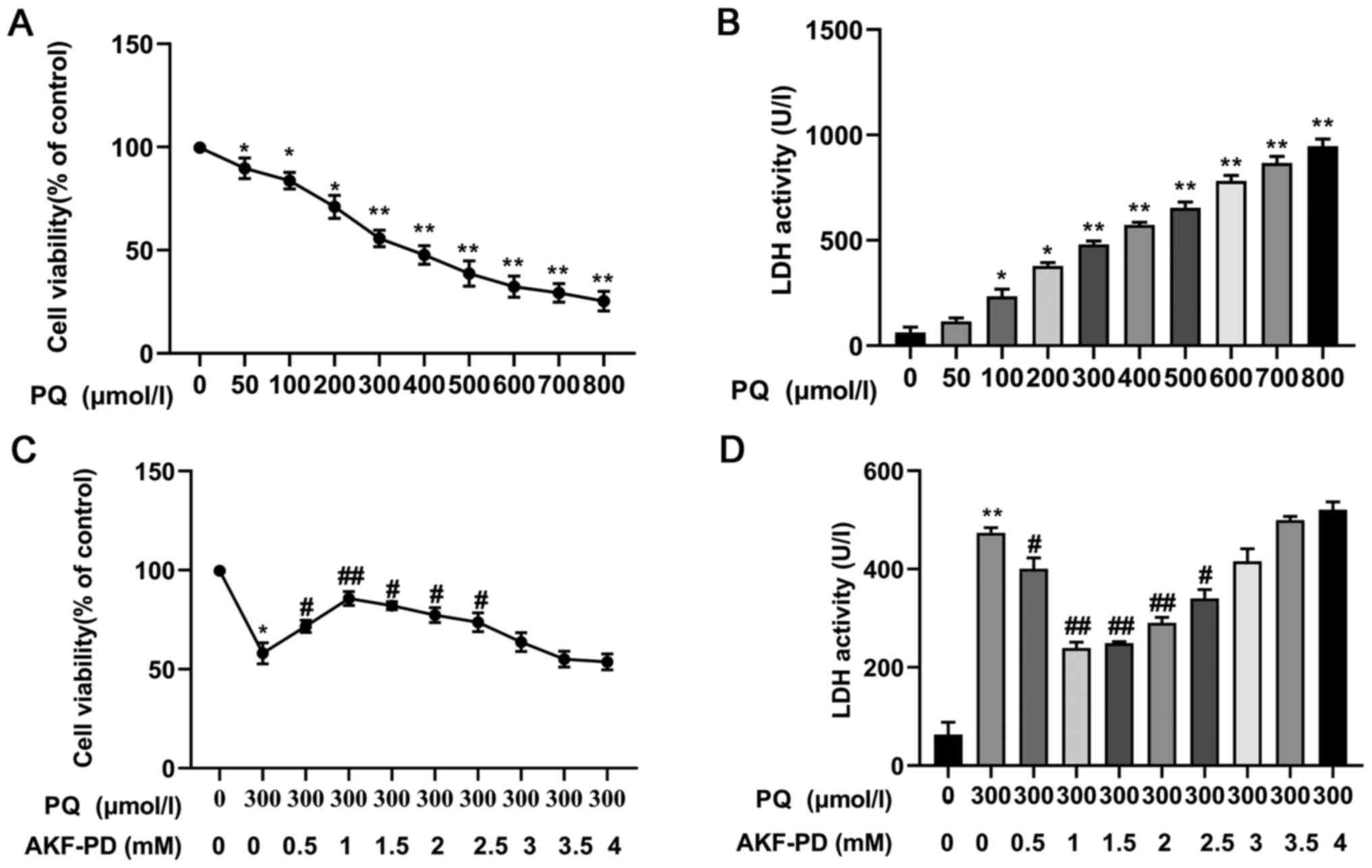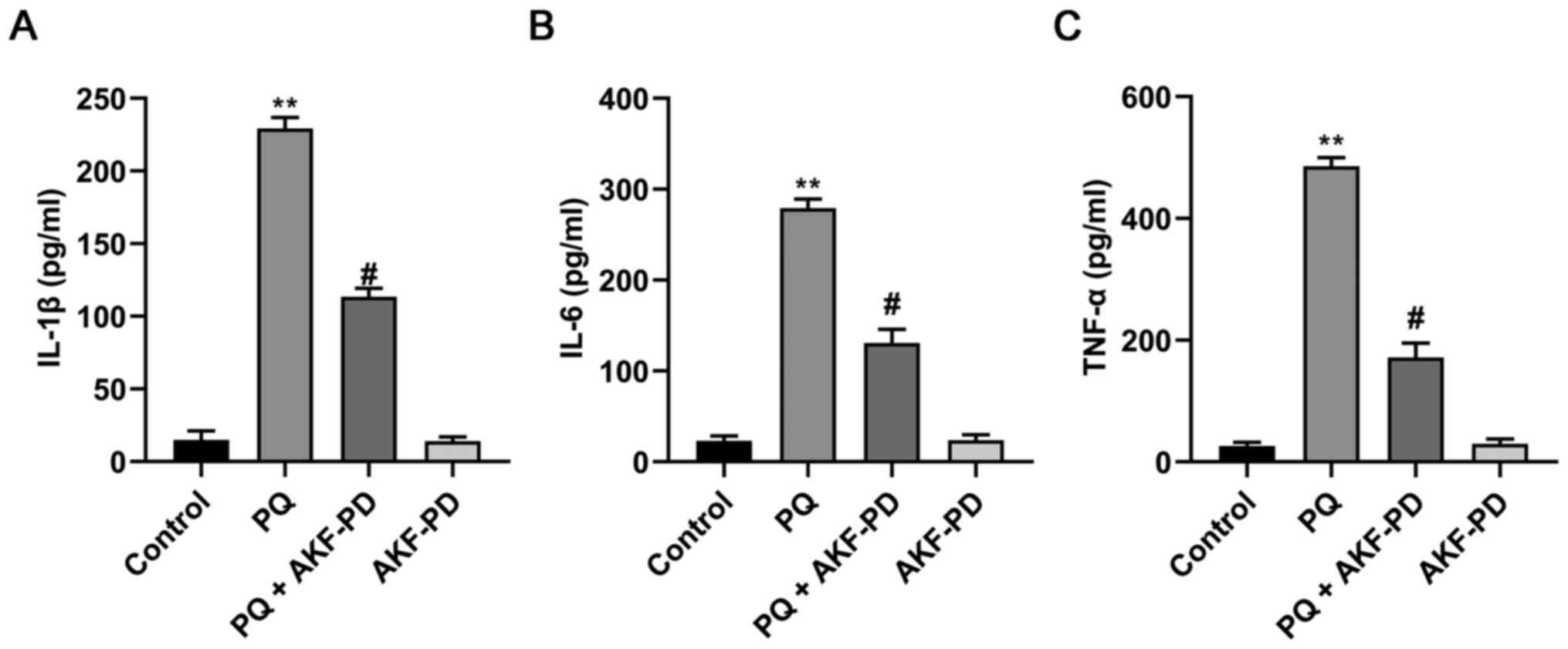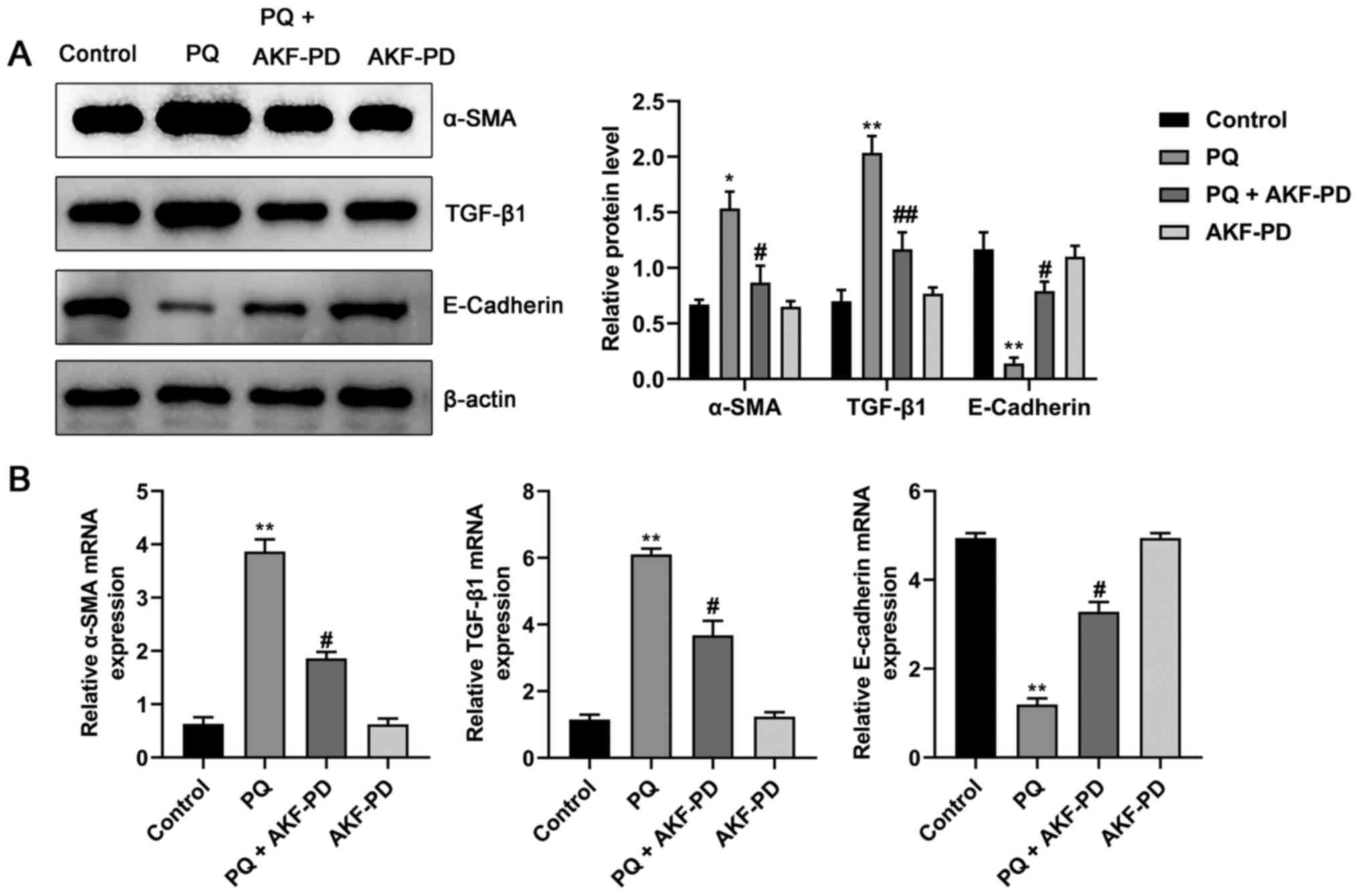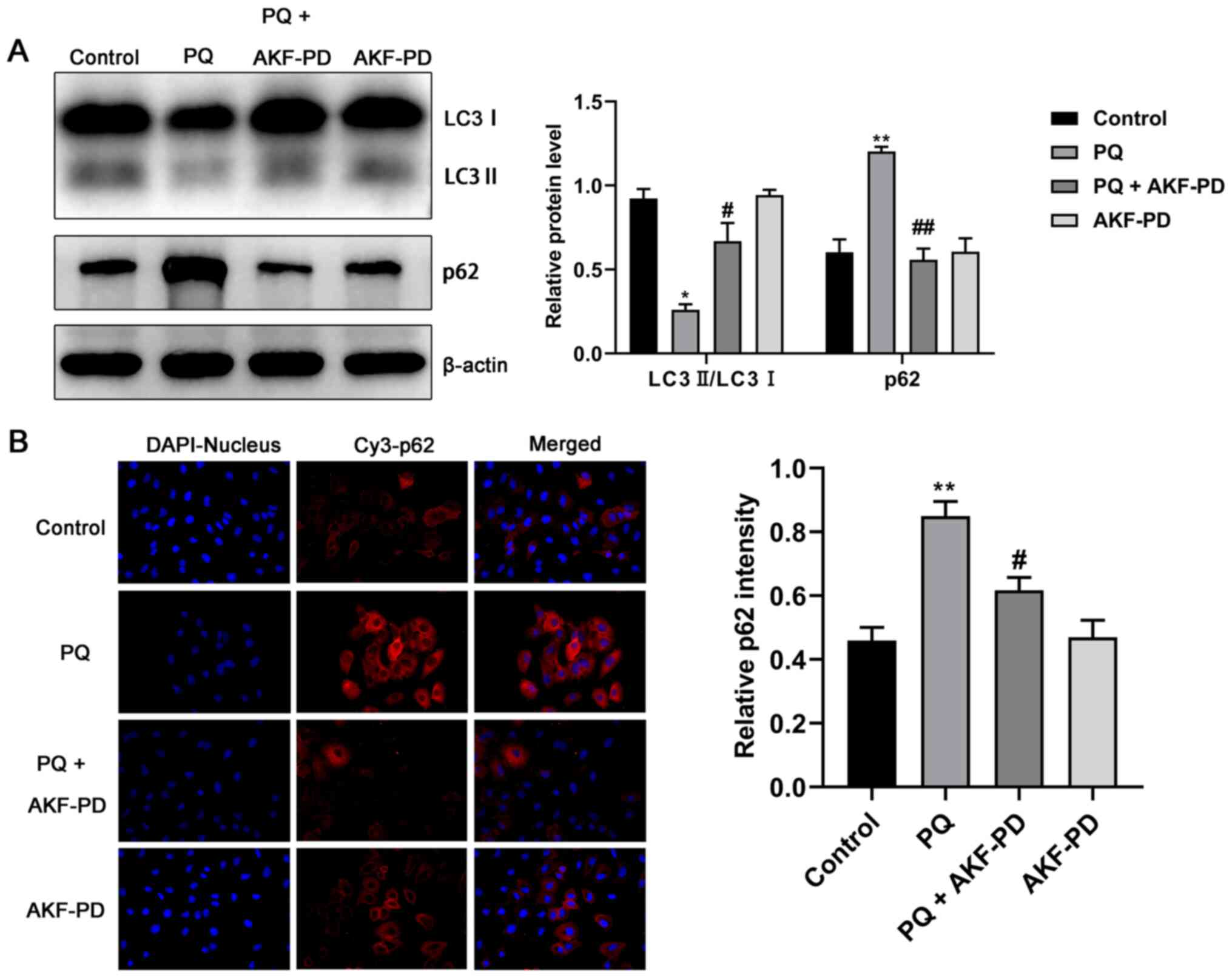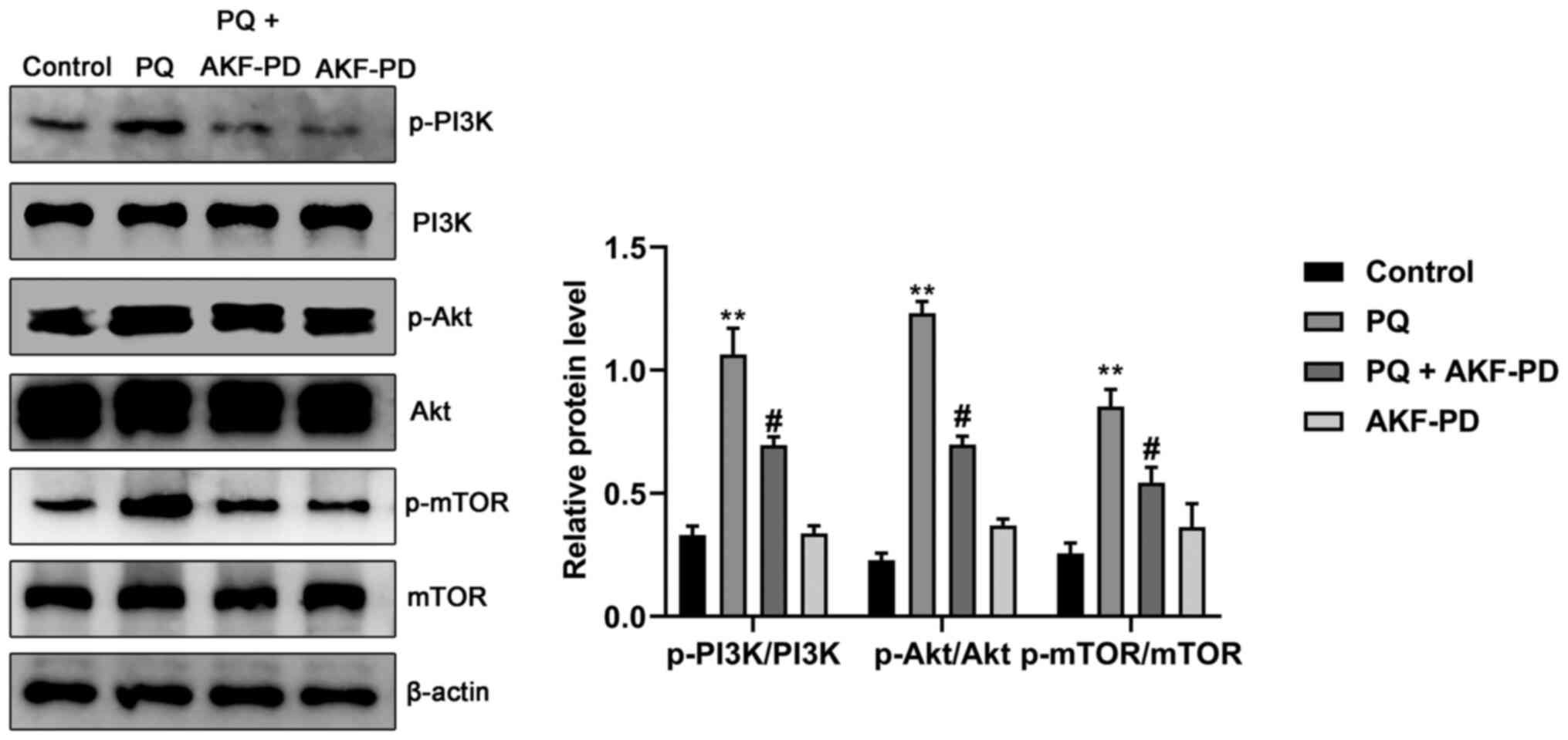|
1
|
Samsamshariat S, Vedaei A, Jahangiri S,
Gavarti MB, Sami R, Taheri A and Dorooshi G: Report of a case of
paraquat poisoning and mediastinal involvement. Adv Biomed Res.
10:52021. View Article : Google Scholar
|
|
2
|
Zhu Y, Tan J, Xie H, Wang J, Meng X and
Wang R: HIF-1α regulates EMT via the Snail and β-acatenin pathways
in paraquat poisoning-induced early pulmonary fibrosis. J Cell Mol
Med. 20:688–697. 2016. View Article : Google Scholar : PubMed/NCBI
|
|
3
|
Suntres ZE: Role of antioxidants in
paraquat toxicity. Toxicology. 180:65–77. 2002. View Article : Google Scholar : PubMed/NCBI
|
|
4
|
Xiao Q, Wang W, Qi H, Gao X, Zhu B, Li J
and Wang P: Continuous hemoperfusion relieves pulmonary fibrosis in
patients with acute mild and moderate paraquat poisoning. J Toxicol
Sci. 45:611–617. 2020. View Article : Google Scholar : PubMed/NCBI
|
|
5
|
Tao W, Shu Y, Miao Q and Zhu Y:
Attenuation of hyperoxia-induced lung injury in rats by
adrenomedullin. Inflammation. 35:150–157. 2012. View Article : Google Scholar : PubMed/NCBI
|
|
6
|
Shen H, Wu N, Wang Y, Zhao H, Zhang L, Li
T and Zhao M: Chloroquine attenuates paraquat-induced lung injury
in mice by altering inflammation, oxidative stress and fibrosis.
Int Immunopharmacol. 46:16–22. 2017. View Article : Google Scholar : PubMed/NCBI
|
|
7
|
Bai L, Li A, Gong C, Ning X and Wang Z:
Protective effect of rutin against bleomycin induced lung fibrosis:
Involvement of TGF-β1/α-SMA/Col I and III pathway. Biofactors.
46:634–644. 2020. View Article : Google Scholar
|
|
8
|
Qian J, Ye Y, Lv L, Zhu C and Ye S: FTY720
attenuates paraquat-induced lung injury in mice. Int
Immunopharmacol. 21:426–431. 2014. View Article : Google Scholar : PubMed/NCBI
|
|
9
|
Xu S, Hu H, Jiang Z, Tang S, Zhou Y, Sheng
J, Chen J and Cao Y: APACHE score, severity index of paraquat
poisoning, and serum lactic acid concentration in the prognosis of
paraquat poisoning of Chinese patients. Pediatr Emerg Care.
31:117–121. 2015. View Article : Google Scholar : PubMed/NCBI
|
|
10
|
Yang H, Zhang W, Xie T, Wang X and Ning W:
Fluorofenidone inhibits apoptosis of renal tubular epithelial cells
in rats with renal interstitial fibrosis. Braz J Med Biol Res.
52:e87722019. View Article : Google Scholar : PubMed/NCBI
|
|
11
|
Song C, He L, Zhang J, Ma H, Yuan X, Hu G,
Tao L, Zhang J and Meng J: Fluorofenidone attenuates pulmonary
inflammation and fibrosis via inhibiting the activation of NALP3
inflammasome and IL-1β/IL-1R1/MyD88/NF-κB pathway. J Cell Mol Med.
20:2064–2077. 2016. View Article : Google Scholar : PubMed/NCBI
|
|
12
|
Ma H, Peng Z, Hu G and Tao L: Effect and
mechanism of fluorofenidone on organ fibrosis. Zhong Nan Da Xue Xue
Bao Yi Xue Ban. 40:208–213. 2015.(In Chinese). PubMed/NCBI
|
|
13
|
Meng J, Zou Y, Hu C, Zhu Y, Peng Z, Hu G,
Wang Z and Tao L: Fluorofenidone attenuates bleomycin-induced
pulmonary inflammation and fibrosis in mice via restoring caveolin
1 expression and inhibiting mitogen-activated protein kinase
signaling pathway. Shock. 38:567–573. 2012. View Article : Google Scholar : PubMed/NCBI
|
|
14
|
Tang J, Li J, Li G, Zhang H, Wang L, Li D
and Ding J: Spermidine-mediated poly(lactic-co-glycolic acid)
nanoparticles containing fluorofenidone for the treatment of
idiopathic pulmonary fibrosis. Int J Nanomedicine. 12:6687–6704.
2017. View Article : Google Scholar : PubMed/NCBI
|
|
15
|
Xu M, Li S, Wang J, Huang S, Zhang A,
Zhang Y, Gu W, Yu X and Jia Z: Cilomilast ameliorates renal
tubulointerstitial fibrosis by inhibiting the TGF-β1-Smad2/3
signaling pathway. Front Med (Lausanne). 7:6261402021. View Article : Google Scholar : PubMed/NCBI
|
|
16
|
Liu J, Song C, Xiao Q, Hu G, Tao L and
Meng J: Fluorofenidone attenuates TGF-β1-induced lung fibroblast
activation via restoring the expression of caveolin-1. Shock.
43:201–207. 2015. View Article : Google Scholar : PubMed/NCBI
|
|
17
|
Saxton RA and Sabatini DM: mTOR signaling
in growth, metabolism, and disease. Cell. 168:960–976. 2017.
View Article : Google Scholar : PubMed/NCBI
|
|
18
|
Alayev A and Holz MK: mTOR signaling for
biological control and cancer. J Cell Physiol. 228:1658–1664. 2013.
View Article : Google Scholar : PubMed/NCBI
|
|
19
|
Gui YS, Wang L, Tian X, Xue L, Ma A, Zhou
W, Zeng N, Ji Z, Cai B, Zhang H, et al: mTOR overactivation and
compromised autophagy in the pathogenesis of pulmonary fibrosis.
PLoS One. 10:e01386252015. View Article : Google Scholar : PubMed/NCBI
|
|
20
|
Gui X, Chen H, Cai H, Sun L and Gu L:
Leptin promotes pulmonary fibrosis development by inhibiting
autophagy via PI3K/Akt/mTOR pathway. Biochem Biophys Res Commun.
498:660–666. 2018. View Article : Google Scholar : PubMed/NCBI
|
|
21
|
Rieg AD, Said S, Carolin A, Eva V, Rolf R,
Stefan U and Christian M: PDGF-BB regulates the pulmonary vascular
tone: Impact of prostaglandins, calcium, MAPK- and PI3K/AKT/mTOR
signalling and actin polymerisation in pulmonary veins of guinea
pigs. Respir Res. 19:1202018. View Article : Google Scholar : PubMed/NCBI
|
|
22
|
Szapiel SV, Elson NA, Fulmer JD,
Hunninghake GW and Crystal RG: Bleomycin-induced interstitial
pulmonary disease in the nude, athymic mouse. Am Rev Respir Dis.
120:893–899. 1979.PubMed/NCBI
|
|
23
|
Livak KJ and Schmittgen TD: Analysis of
relative gene expression data using real-time quantitative PCR and
the 2(-Delta Delta C(T)) method. Methods. 25:402–408. 2001.
View Article : Google Scholar : PubMed/NCBI
|
|
24
|
Liu MW, Su MX, Tang DY, Hao L, Xun XH and
Huang YQ: Ligustrazin increases lung cell autophagy and ameliorates
paraquat-induced pulmonary fibrosis by inhibiting PI3K/Akt/mTOR and
hedgehog signalling via increasing miR-193a expression. BMC Pulm
Med. 19:352019. View Article : Google Scholar : PubMed/NCBI
|
|
25
|
Raghu G, Rochwerg B, Zhang Y, Garcia CA,
Azuma A, Behr J, Brozek JL, Collard HR, Cunningham W, Homma S, et
al: An official ATS/ERS/JRS/ALAT clinical practice guideline:
Treatment of idiopathic pulmonary fibrosis. An update of the 2011
clinical practice guideline. Am J Respir Crit Care Med. 192:e3–19.
2015. View Article : Google Scholar : PubMed/NCBI
|
|
26
|
Wang J, Qiao L, Li S and Yang G:
Protective effect of ginsenoside Rb1 against lung injury induced by
intestinal ischemia-reperfusion in rats. Molecules. 18:1214–1226.
2013. View Article : Google Scholar : PubMed/NCBI
|
|
27
|
Wu J, Chu Z, Ruan Z, Wang X, Dai T and Hu
X: Changes of intracellular porphyrin, reactive oxygen species, and
fatty acids profiles during inactivation of methicillin-resistant
staphylococcus aureus by antimicrobial blue light. Front Physiol.
9:16582018. View Article : Google Scholar : PubMed/NCBI
|
|
28
|
Yamada M, Kuwano K, Maeyama T, Hamada N
Michihiro Yoshimi, Yoichi Nakanishi and Kasper M:
Dual-immunohistochemistry provides little evidence for
epithelial-mesenchymal transition in pulmonary fibrosis. Histochem
Cell Biol. 129:453–462. 2008. View Article : Google Scholar : PubMed/NCBI
|
|
29
|
Molina-Molina M, Machahua-Huamani C,
Vicens-Zygmunt V, Llatjós R, Escobar I, Sala-Llinas E,
Luburich-Hernaiz P, Dorca J and Montes-Worboys A: Anti-fibrotic
effects of pirfenidone and rapamycin in primary IPF fibroblasts and
human alveolar epithelial cells. BMC Pulm Med. 18:632018.
View Article : Google Scholar : PubMed/NCBI
|
|
30
|
Chitra P, Saiprasad G, Manikandan R and
Sudhandiran G: Berberine inhibits Smad and non-Smad signaling
cascades and enhances autophagy against pulmonary fibrosis. J Mol
Med (Berl). 93:1015–1031. 2015. View Article : Google Scholar : PubMed/NCBI
|
|
31
|
Liu Z, Li Y, Song H, He J, Li G, Zheng Y
and Li B: Collagen peptides promote photoaging skin cell repair by
activating the TGF-β/Smad pathway and depressing collagen
degradation. Food Funct. 10:6121–6134. 2019. View Article : Google Scholar : PubMed/NCBI
|
|
32
|
Eskelinen E: Autophagy: Supporting
cellular and organismal homeostasis by self-eating. Int J Biochem
Cell Biol. 111:1–10. 2019. View Article : Google Scholar : PubMed/NCBI
|
|
33
|
Lv X, Li K and Hu Z: Autophagy and
Pulmonary Fibrosis. Adv Exp Med Biol:. 1207:569–579. 2020.
View Article : Google Scholar : PubMed/NCBI
|
|
34
|
Tian K, Chen P, Liu Z, Si S, Zhang Q, Mou
Y, Han L, Wang Q and Zhou X: Sirtuin 6 inhibits epithelial to
mesenchymal transition during idiopathic pulmonary fibrosis via
inactivating TGF-β1/Smad3 signaling. Oncotarget. 8:61011–61024.
2017. View Article : Google Scholar : PubMed/NCBI
|
|
35
|
Mu E, Wang J, Chen L, Lin S, Chen J and
Huang S: Ketogenic diet induces autophagy to alleviate
bleomycin-induced pulmonary fibrosis in murine models. Exp Lung
Res. 47:26–36. 2021. View Article : Google Scholar : PubMed/NCBI
|
|
36
|
Im J, Hergert P and Nho R: Reduced FoxO3a
expression causes low autophagy in idiopathic pulmonary fibrosis
fibroblasts on collagen matrices. Am J Physiol Lung Cell Mol
Physiol. 309:L552–L561. 2015. View Article : Google Scholar : PubMed/NCBI
|
|
37
|
Xie T, Xu Q, Wan H, Xing S, Shang C, Gao Y
and He Z: Lipopolysaccharide promotes lung fibroblast proliferation
through autophagy inhibition via activation of the PI3K-Akt-mTOR
pathway. Lab Invest. 99:625–633. 2019. View Article : Google Scholar : PubMed/NCBI
|
|
38
|
Patel AS, Lin L, Geyer A, Haspel JA, An
CH, Cao J, Rosas IO and Morse D: Autophagy in idiopathic pulmonary
fibrosis. PLoS One. 3:e413942012. View Article : Google Scholar
|
|
39
|
Jung C, Ro S, Cao J, Otto N and Kim D:
mTOR regulation of autophagy. FEBS Lett. 584:1287–1295. 2010.
View Article : Google Scholar : PubMed/NCBI
|
|
40
|
Nho R and Hergert P: IPF fibroblasts are
desensitized to type I collagen matrix-induced cell death by
suppressing low autophagy via aberrant Akt/mTOR kinases. PLoS One.
9:e946162014. View Article : Google Scholar : PubMed/NCBI
|















